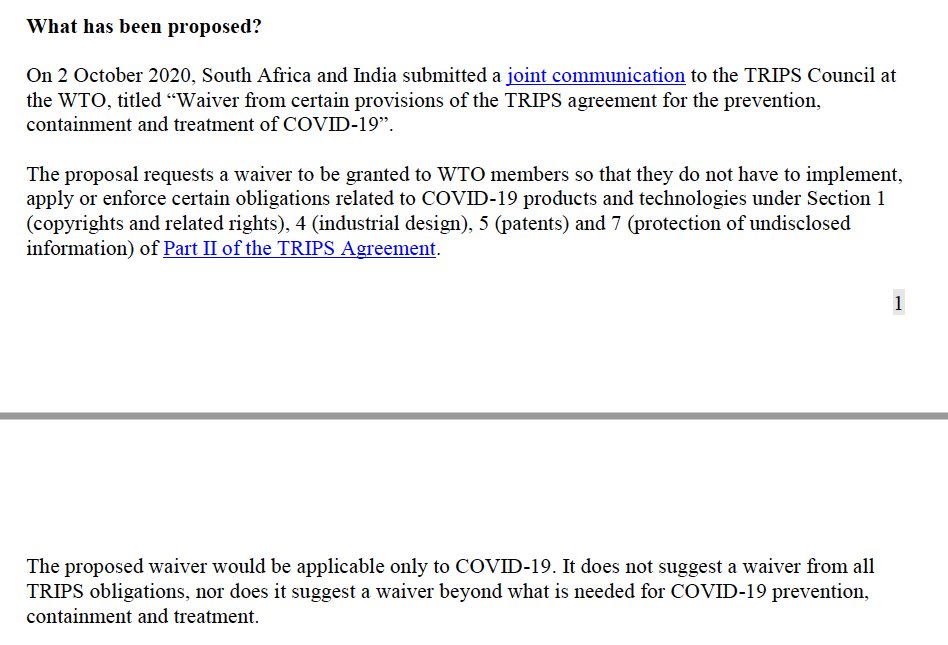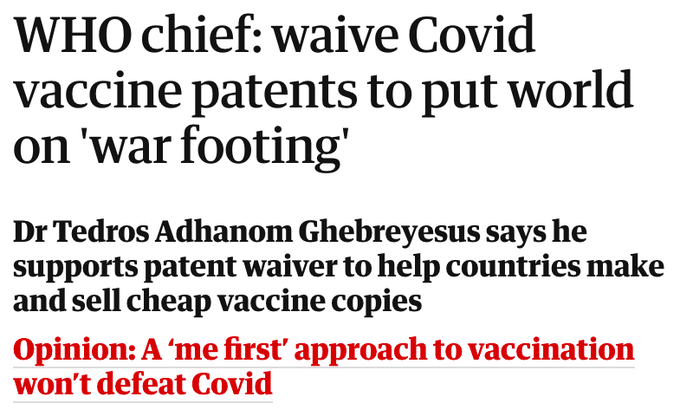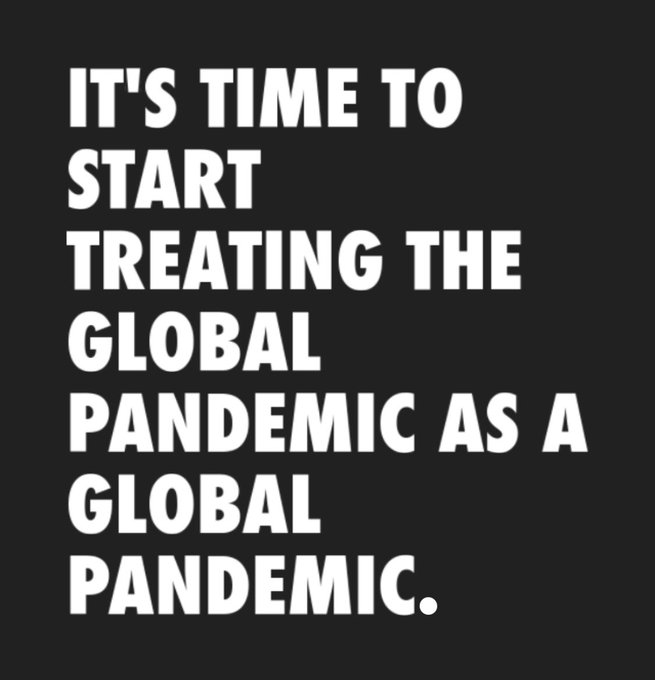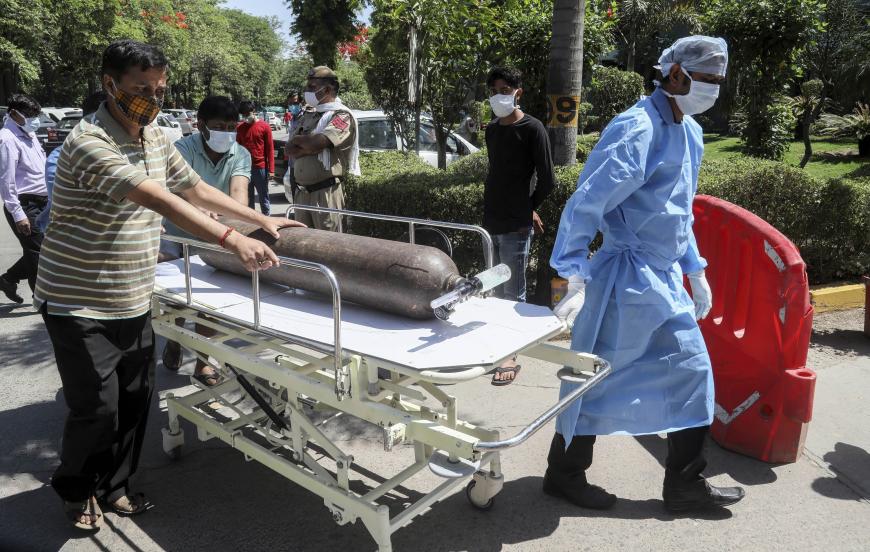Despite global vaccine shortages, the EU, US, UK and other rich governments continue to block wider vaccine production globally by obstructing the #TRIPSwaiver at the WTO.
But pressure on these governments to stop prioritizing pharma company profits over human lives is growing.
But pressure on these governments to stop prioritizing pharma company profits over human lives is growing.

Media attention is only growing...
The flagship @BBCNewsnight had an excellent long piece on the issue at the end of last week:
The flagship @BBCNewsnight had an excellent long piece on the issue at the end of last week:
https://twitter.com/BBCNewsnight/status/1387891822349979652
Even major media outlets that you might generally expect to lean toward the companies' view are producing excellent reporting highlighting the problem.
This from the WSJ, for example: wsj.com/articles/india…
This from the WSJ, for example: wsj.com/articles/india…

The White House is reportedly divided between pro-profit and pro-humanity camps...
washingtonpost.com/health/2021/04…
washingtonpost.com/health/2021/04…

The EU also seems to be split, with some voices at the Commission hinting they disagree with the EU policy to block wider vaccine production globally...
https://twitter.com/astroehlein/status/1384019616083505158
Global pressure has been building for months...
The #TRIPSwaiver - a proposal at the World Trade Organization (WTO) to temporarily waive some intellectual property rules for medical products - was initially led by India & South Africa in October: msfaccess.org/sites/default/…
The #TRIPSwaiver - a proposal at the World Trade Organization (WTO) to temporarily waive some intellectual property rules for medical products - was initially led by India & South Africa in October: msfaccess.org/sites/default/…

The #TRIPSwaiver is backed by:
✅ Over 100 governments: reliefweb.int/report/world/o…
✅ Past presidents & prime ministers and Nobel laureates: project-syndicate.org/commentary/pre…
✅ Major international NGOs: peoplesvaccine.org
✅ Over 100 governments: reliefweb.int/report/world/o…
✅ Past presidents & prime ministers and Nobel laureates: project-syndicate.org/commentary/pre…
✅ Major international NGOs: peoplesvaccine.org
https://twitter.com/astroehlein/status/1389109483750764546/photo/1

The #TRIPSwaiver is also backed by:
✅ Medical experts: thelancet.com/journals/lance…
✅ The head of the WHO: theguardian.com/world/2021/mar…
✅ Hundreds of European lawmakers: hrw.org/news/2021/04/2…
✅ US lawmakers: thehill.com/policy/healthc…
✅ Trade unions: etuc.org/en/document/le…
✅ Medical experts: thelancet.com/journals/lance…
✅ The head of the WHO: theguardian.com/world/2021/mar…
✅ Hundreds of European lawmakers: hrw.org/news/2021/04/2…
✅ US lawmakers: thehill.com/policy/healthc…
✅ Trade unions: etuc.org/en/document/le…

Opposed to all of us are those who want to continue prioritizing profits over human lives.
For 7 months they have been fighting the #TRIPSwaiver…
When it was first proposed in early October, some 1 million of us had died of Covid.
Today, the death toll is over 3.2 million.
For 7 months they have been fighting the #TRIPSwaiver…
When it was first proposed in early October, some 1 million of us had died of Covid.
Today, the death toll is over 3.2 million.

The numbers make clear that the current profit-first system of global vaccinations is not working.
Over 4 months into the rollout, only 3.5% of the world has been fully vaccinated.
It's estimated that 70% is needed for herd immunity.
At this rate, it will take years.
Over 4 months into the rollout, only 3.5% of the world has been fully vaccinated.
It's estimated that 70% is needed for herd immunity.
At this rate, it will take years.

With the shortage of vaccines - created by the profits-first approach of the EU, US, UK & others - there's been a scramble for scarce doses.
Rich governments are buying them up; poor governments are left with little or nothing.
So, vaccine rollout has been hugely uneven.
Rich governments are buying them up; poor governments are left with little or nothing.
So, vaccine rollout has been hugely uneven.

➡️ 83% of shots that have gone into arms worldwide have been administered in high- & upper-middle-income countries.
➡️ Only 0.2 percent of doses have been administered in low-income countries.
nytimes.com/interactive/20…
➡️ Only 0.2 percent of doses have been administered in low-income countries.
nytimes.com/interactive/20…

Global vaccine rollout is too slow and too uneven.
Because companies prioritize profits over production, and because the rich governments are allowing them to do so, there are simply not enough doses being made fast enough.
Because companies prioritize profits over production, and because the rich governments are allowing them to do so, there are simply not enough doses being made fast enough.
It is truly a race against time, but the rich governments have been acting like time doesn't matter...
In typical "first world" fashion, they think they can disregard global needs...
But this short-sighted policy will come back to bite all of us...
oxfam.org/en/press-relea…
In typical "first world" fashion, they think they can disregard global needs...
But this short-sighted policy will come back to bite all of us...
oxfam.org/en/press-relea…

By blocking wider production of vaccines globally, these governments are prolonging the global pandemic, meaning:
⬛️ more death;
⬛️ more economic disruption;
⬛️ more chance for new variants to emerge that are more virulent, more deadly and/or resistant to current vaccines.
⬛️ more death;
⬛️ more economic disruption;
⬛️ more chance for new variants to emerge that are more virulent, more deadly and/or resistant to current vaccines.
So, it's good that pressure is increasing on the EU, US, UK & others to end their failing, profits-first approach to the global pandemic, and there is discussion about changing course.
❓ But when time is measured in lives lost, how many more deaths will it be before they act?
❓ But when time is measured in lives lost, how many more deaths will it be before they act?

Australia, too...
"Indian Coronavirus Outbreak Shows Australia is on the Wrong Side of the Global Fight Over Vaccine Access"
hrw.org/news/2021/05/0…
"Indian Coronavirus Outbreak Shows Australia is on the Wrong Side of the Global Fight Over Vaccine Access"
hrw.org/news/2021/05/0…

"If the #TRIPSwaiver had been adopted last October when it was proposed, it could already be giving low and middle-income countries like India the ability to expand production of lifesaving medical products."
- @AkshayaSays, Human Rights Watch
- @AkshayaSays, Human Rights Watch
"if this waiver was accepted it would untie the hands of producers everywhere, allowing them to contribute to efforts to massively scale up manufacturing of desperately needed tests, treatments, and vaccines worldwide."
Instead of debating about how to ration vaccines better or more equitably, we could be rationing less.
We need more production.
We need our governments to stop blocking it.
We need more production.
We need our governments to stop blocking it.

🇪🇺 Calling all EU citizens! 🇪🇺
Please SIGN this official European Citizens' Initiative to get the EU to stop blocking wider vaccine production:
🌐 And calling everyone! 🌐
Please SHARE it!
➡️➡️➡️ noprofitonpandemic.eu
Please SIGN this official European Citizens' Initiative to get the EU to stop blocking wider vaccine production:
🌐 And calling everyone! 🌐
Please SHARE it!
➡️➡️➡️ noprofitonpandemic.eu

• • •
Missing some Tweet in this thread? You can try to
force a refresh







